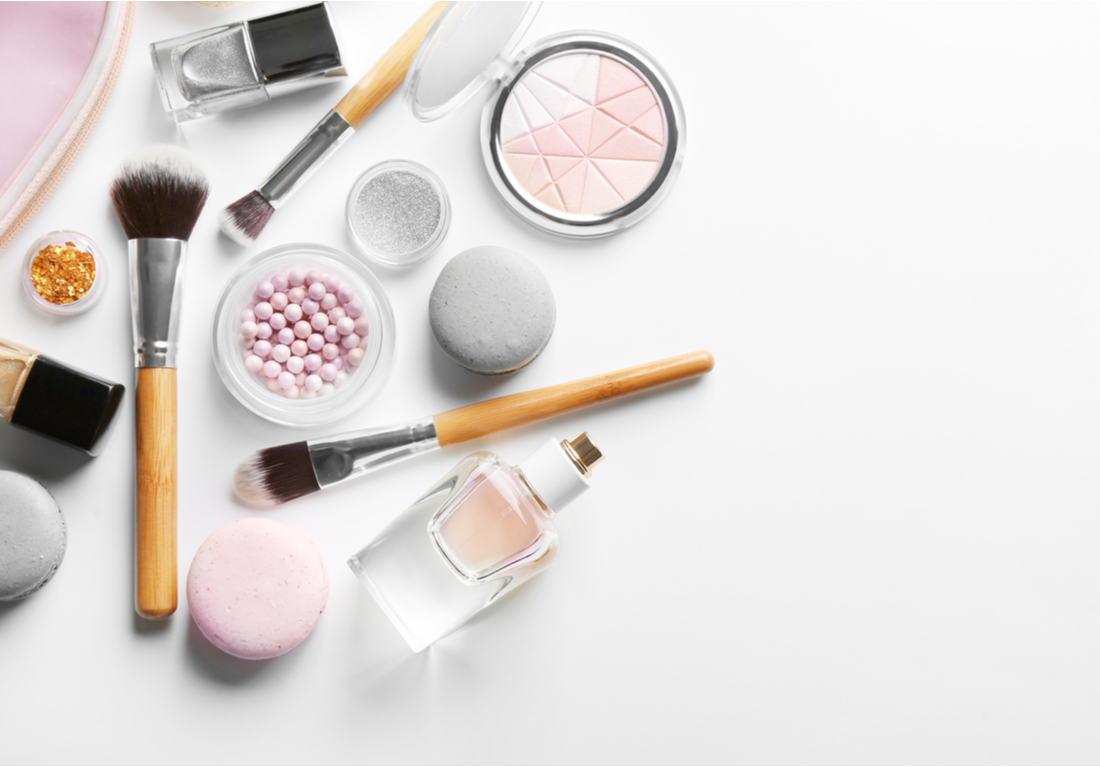
Cosmetic Makeup Vs. Mineral Makeup: The Benefits Of Mineral Makeup
UPDATED 24/3/20
We Irish folk are fond of makeup. We've a penchant for making ourselves darker, especially those of us who are genetically-predisposed to Casperness.
But that is us, it is who we are - we knew what Double Wear was long before we learned about mitosis, APR or, well, basic nutrition. Herein lies the problem: a vast many of you out there were taught to conceal rather than to treat, and to conceal with products that are basically grease paint... remember Pan Stick? Those were the days!
Because makeup was touted as the solution to all skin woes, it is hard for us to believe how damaging it can be to the skin. In this respect, I'm speaking of strictly cosmetic makeup, your typical Revlons, Estée Lauders, Macs and so on and so forth.
Cosmetic Makeup and the Skin
It is difficult to turn to people and tell them not to wear cosmetic makeup, as it is something they are so used to and often, something they rely on. However, it can be detrimental to skin health.The Negative Effects of Cosmetic Makeup
Cosmetic makeup is often comedogenic, meaning that it can clog pores, causing open comedones (blackheads), closed comedones (whiteheads) and other forms of congestion. Considering this is the type of thing you're trying to cover up, it is not ideal. You're just feeding the Franks.
This is especially true of thicker formulations - even if they call themselves non-comedogenic. Be wary of sticks, creams and thick liquids and remember this does not just apply to base makeup like foundation and concealer, but to blushers, highlighters and contour products! Many cosmetic makeups contain alcohol, under the pseudonyms SD alcohol and denatured alcohol/alcohol denat. If you've ever heard me speak about this type of alcohol, you know that it is rarely good news when it shows up in a product.
Alcohol in makeup (and skincare) serves two main purposes: it immediately mops up oil slicks, mattifying the skin in the short term, and helps products to dry on quickly. Most avoid makeup that takes a while to dry in and consider it to be a big no-no. It may actually be a sign that it doesn't contain as much alcohol as other products.
Seeing as many popular products are made to smell non-chemical-ly with fragrances, they can cause photosensitivity, leading to skin damage in the future. Nobody wants to put something on their face that smells like a toilet cleaner (although maybe it shouldn't smell like that in the first place) but that doesn't mean that your skin should be disrespected.
Cosmetic powders can contain a lot of talc. Talc is technically a mineral - however, it sucks up all moisture around it, which makes it so ideal for throwing it into sweaty runners but so drying on the skin. For those of us on the oilier side of things, this sounds perfect... so why isn't it? When you dry out the skin, it causes the pores to over-produce oil to compensate for this, which can lead to more breakouts and more oiliness.
So, talc can be a bit reductive as far as ingredients go. All in all, fragrances, alcohol and other ingredients that dry out and sensitise the skin can speed up the skin's ageing process, which actually begins around the hooman age of 25. The youths think that they can get away with everything; laissez-faire regimes, half-arsed cleansing with a wipe and caking on the cosmetic makeup... but perhaps their skin is not as youthful as they think! In Ireland, most of us wear face makeup every single day, for about 10 hours a day.
That is 10 hours of your skin being smothered by heavy, pore-clogging formulations, drying it out minute by minute. Not only can cosmetic makeup exacerbate acne, but it can cause an acne subtype called acne cosmetica. Are you prone to tiny bumps across your forehead that won't go away no matter what you do? You could be a sufferer of acne cosmetica.
Why Mineral Makeup is Beneficial
Mineral makeup sits on the pore due to its molecular make up, rather than in the pore as cosmetic makeup does. Cosmetic makeup is like wall filler, being slopped into each pore to make them less visible, leading to the creation of congestion. Mineral makeup still reduces visibility of pores and blemishes without intruding on your skin and disrupting its natural mechanisms of protection. Minerals (for example, zinc, mica, titanium) are not corrosive to the skin, even in their makeup-safe forms of zinc oxide, zinc mica and titanium dioxide.
They respect the skin and do not dry it out. Minerals bind to oils! It is no secret that powder foundation can be key for those of us trying to get rid of the midday makeup slip and slide. The oil-binding properties of mineral makeup means that the natural oils your skin produce become a base for your makeup, meaning that it will go on easier and have a glowy finish.
Both titanium oxide and zinc oxide, two ingredients commonly found in mineral makeup products, act as a physical block from sun damage. I'm not saying to skip applying SPF altogether, but it is nice to think of it as a safety net to doubly protect you against those rays. Zinc oxide has anti-inflammatory properties, and seeing as it is in a much higher dosage than it would be in a cosmetic makeup, it can soothe conditions such as rosacea, eczema and inflammatory acne.
Product Purity
Not all cosmetic makeup brands are the same, so I am not sure as to why people believe all mineral makeup to be on equal footing. It is becoming immensely popular for non-mineral brands to stick the word ""mineral"" somewhere into the name of their product and pass it off as a true mineral product. It is like sticking the word ""educational"" before any old television show and then telling people it will teach their kids long division. When I talk about mineral makeup, I'm talking about the purest of the pure.
For me, that is embodied by the brand that is Jane Iredale. Jane Iredale was a casting director and producer in the US who saw so many young actors having their faces smeared with thick, greasy, congestion-causing stage makeup day in and day out that she decided to provide an alternative.
Jane Iredale use high-quality minerals and cutting-edge technology to create mineral makeup that gives great coverage whilst being skin respectful, and their makeup is 100% talc-free too. Some brands bulk out their product with talc so that they can make the claim that the product is fully mineral, and some other brands that began as fully mineral have started to include non-mineral ingredients whilst carefully excising any mention of 100% mineral-ness from their marketing campaigns and packaging so be wary when it comes to this.
Liquid Vs. Powder Formulations
Any liquid cosmetic product will need a preservative and water in some form - pure and simple. This means that the benefits of the minerals are... watered down. Because of this, I always say that powder is better but if you are a first-timer who needs a transitional product, then a liquid formulation is better than nothing. I'd specifically recommend the Jane Iredale Glow Time BB cream. Don't be fooled by the name BB cream.. this bad BB is full coverage. See for your own eyes below...
 Here is a swatch of Jane Iredale Glow Time BB 6... on someone who is usually BB 3. Look at that coverage though.
Here is a swatch of Jane Iredale Glow Time BB 6... on someone who is usually BB 3. Look at that coverage though.
The main worry surrounding powder formulations is lack of coverage and it is completely unfounded. Mineral powders are incredibly buildable and you can layer and layer it to bring it up to the concealment you want - it is important to colour match to the highest level so that you are not left with bright yellow or pink patches across the face as some mineral makeups are highly pigmented!


